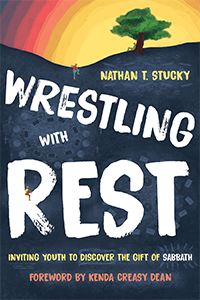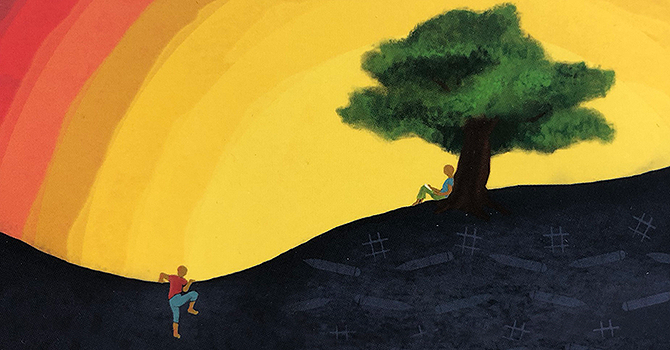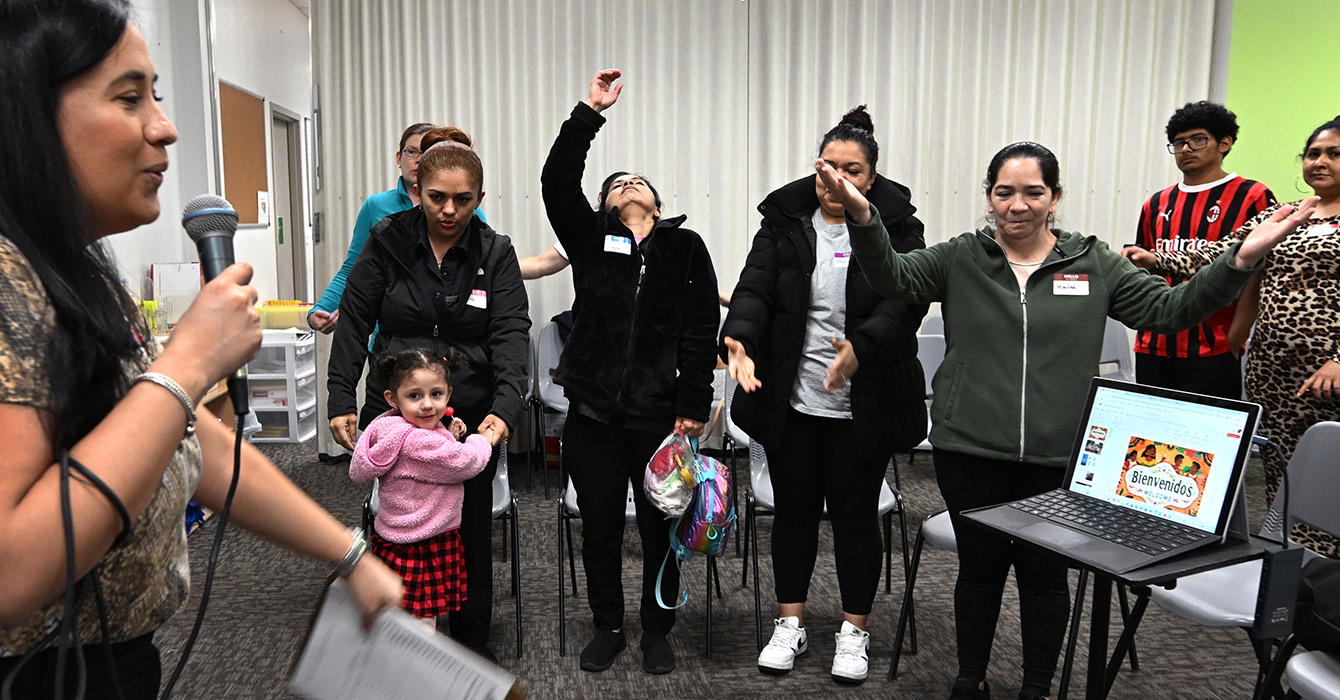Young people need Sabbath -- indeed, they long for it, says Nathan T. Stucky, the author of a book on youth and Sabbath.
But like the adults in their lives, and the culture around them, young people feel driven to be productive.
Observing the Sabbath is not just a chance to take a break but is rather a reframing of what it means to be a beloved child of God, he said.
“Those of us who love young people have been willing to do just about anything for them to help them grasp the faith, to help them receive the faith. We have worked tirelessly to try to get them to receive this gift,” he said.
“But have we overlooked the possibility that the thing that we needed to do was just stop and rest?”
 Stucky was inspired to write the book by his experience as a youth pastor, a parent and the director of the Farminary at Princeton Theological Seminary, where he is intimately familiar with the cycle of death and rebirth that he sees as crucial to understanding the Sabbath.
Stucky was inspired to write the book by his experience as a youth pastor, a parent and the director of the Farminary at Princeton Theological Seminary, where he is intimately familiar with the cycle of death and rebirth that he sees as crucial to understanding the Sabbath.
Stucky spoke to Faith & Leadership’s Sally Hicks about his book “Wrestling With Rest: Inviting Youth to Discover the Gift of Sabbath.” The following is an edited transcript.
Faith & Leadership: What’s the connection between death, rebirth and the Sabbath?
 Nathan T. Stucky: I am trying to make a case that Sabbath is a practice of receiving life through death and that, for us and for our young people, if Sabbath is going to thrive, something else in our lives is going to have to pass away.
Nathan T. Stucky: I am trying to make a case that Sabbath is a practice of receiving life through death and that, for us and for our young people, if Sabbath is going to thrive, something else in our lives is going to have to pass away.
I try to name some of the things that might need to pass away, and one of those things is identities that are rooted in productivity or accomplishment or consumption. Our truest, deepest identity can’t be rooted there; it needs to be rooted, I think, in God’s grace.
I perceive a bit of a bias in a lot of Sabbath literature toward rest and rejuvenation and recreation. Afternoon naps and feasting and all of that is part of the Sabbath, but if we actually look at our own lives and at the Sabbath stories that appear in Scripture, it’s a lot more complicated than that.
There’s something more going on here than Sabbath rest being this easy commodity that we can pull off a shelf.
F&L: Why focus on youth? Why do you think that’s particularly important?
NS: Part of it is simply my own experience. After college, I worked as a youth pastor for a half-dozen years before farming for a couple of years and then coming to Princeton Seminary, and so love of young people is core to my own sense of vocation. I’m a parent; my oldest is 16.
Young people have a way of holding up a mirror to prior generations in a way that is pretty profound -- and in this case, pretty sobering.
You dig into the stories of these young people and you realize that they haven’t misunderstood us about rest; they’re following our lead.
F&L: It’s pretty common to hear the complaint that young people are overscheduled. But aren’t you talking about something more profound than just a scheduling problem?
NS: I see in [today’s mindset] a temptation for our young people that is analogous to the struggle of the Israelites in the wilderness after the exodus, which is you’re immersed in this context where your identity is reduced to what you can produce for the Israelites in Egypt. The inertia of centuries of captivity propels you into continuing that, and you just keep going and going and going, and in some sense the only way to break that is at some point to stop.
Which, of course, is the root of the term “Sabbath” -- it means to stop or to cease.
And so for young people, at some point I want them to be able to just stop and put down the AP class, put down soccer, put down band, put down your resume, put down your college applications -- stop all of that so you can remember that prior to all of that, after all of that, in the midst of all of that, who you are is a beloved child of God.
It’s just a gift. It’s an identity-wrecking but identity-rooting gift that messes with every other identity but in the end gives us the thing that we most desperately long for. That is the anchor, the root for that identity that is deeper and more secure than anything that could be fabricated by strictly human effort.
F&L: You asked young people to keep time diaries and then did some digging into that with them. You found that they longed for rest but it also made them anxious, right?
NS: I was trying to understand how they understand and experience rest. I got to hang out one spring with 39 seniors in high school and had them fill out time diaries for seven days. And then we dove into those time diaries.
I said, “I want you to go through these time diaries and highlight for me any entry in the diary where you rest, however you define rest.” And then we got together and we unpacked, “What did you highlight, and why did you highlight it?”
And they ultimately defined rest with reference to anxiety and stress and worry; something counted as rest if it reduced their anxiety or stress. So everything from going on a run to playing a musical instrument to watching Netflix -- all these things could have been highlighted as rest for these young people.
But the most sobering part of the research was then continuing to unpack that. There’s this sense of longing for a rest that’s vast enough to encompass their whole being and yet this confession that when they try to enter that kind of rest it creates its own anxiety. Most frequently, it would create anxiety because to stop all of the activity would then mean that you begin to think about all the things that you’re not getting done.
My interpretation of that anxiety that rest itself creates is that the anxiety points to a threat to the identity they’ve inherited -- from the broader society and culture and oftentimes from the church -- that says your worth, your value, your identity as a human, is wrapped up in your perpetual motion.
So to stop that is a challenge. It’s a threat to how we conceive of ourselves.
F&L: This reminds me of the part of the book where you tell your own story -- you were indeed practicing Sabbath in the sense of not working during the time you were doing your Ph.D., and yet you were having panic attacks in the middle of your Sabbath because of everything you weren’t doing. So how does one practice Sabbath with intentionality?
NS: I think there are many, many different ways to answer that question. The last chapter of the book gets into some of what I think of as kind of paradigmatic Sabbath practices, which include corporate worship. I think sharing meals is an important way that we can practice Sabbath. I think telling stories, and a host of other things.
But the challenge in all of this is that every kind of possible Sabbath practice brings with it a risk that we reduce it to another task on our to-do list.
That reduces Sabbath to a matter of human agency -- it’s just about what humans do. And so for me, the great opportunity of the Sabbath is that we shift our focus from what we do to what God is doing.
The story of creation unfolds through these seven days, and you get to day six and God finally creates humankind, and then God gives them this job description -- be fruitful, multiply, have dominion, all these things. It seems like you get to day seven and humans should be ready to get to work, but that’s not how the story goes. On day seven, it is God’s Sabbath to rest -- and presumably, with all creation.
I think that’s a beautiful Sabbath image. The invitation we receive from God through the Sabbath is that we stop our work and reflect on God’s.
F&L: It’s quite a beautiful vision, and I don’t mean to be a skeptic, but having known a few teenagers, I wonder how optimistic you are that this can really be part of teenage formation, or part of teenage lives.
NS: I’m reminded of a book by a woman named Judith Shulevitz; she wrote a book about a decade ago, “The Sabbath World: Glimpses of a Different Order of Time.” It’s a fascinating survey of all things Sabbath, and she really tries to embrace a Sabbath rhythm through the course of researching and writing the book.
Then she gets to the last chapter of the book, and she basically says, “I absolutely love the Sabbath -- I think it is beautiful -- but I can’t do it.” And she says, “The only way I could imagine actually living this is if I lived in a community that embraced it.” I think she’s right.
There is nowhere in Scripture that I can tell where an image of Sabbath is given and it’s one person and God. It is always given to the community. And it’s given to the whole creation on the seventh day. It’s given to the whole Israelite community in the wilderness. It’s promised to the whole creation at the end of time.
So is it realistic for kids? I don’t think so.
There will always be more than enough temptation in a thousand other directions, but I do think it’s possible that grace can take root in a community. The only way that my kids can taste anything like Sabbath is a little bit in our family, but it depends even more on our church. It depends on the people with whom we share life and bread and faith. Are they grasping the grace-rooted identity that I tried to articulate in the book?
I hope that it sits somewhere inside them and that ultimately they realize that before they existed they were loved. And that whatever they do or don’t do with their lives, it sits in this broader frame. It sits in the promise of rest and grace that comes from a God who is real.
Am I optimistic about this? No way. But I’m deeply hopeful. I'm deeply hopeful.














